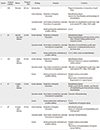Abstract
Purpose
The purpose of this study was to develop a breastfeeding empowerment program and to investigate the effects of the breastfeeding empowerment program on self-efficacy, adaptation and continuation of breastfeeding for primiparous women.
Methods
The 5 session breastfeeding empowerment program was developed and a non-equivalent control group non-synchronized quasi-experiment design was used. Fifty-five participants were assigned to either the experimental group (n=27) or the control group (n=28). Effects were tested using repeated measures ANOVA and χ2-test.
Figures and Tables
Table 3
Homogeneity Test for Obstetrical, Breastfeeding Characteristics and Breastfeeding Self-efficacy (N=55)

References
1. Chung SH, Kim HR, Choi YS, Bae CW. Trends of breastfeeding rate in Korea (1994-2012): Comparison with OECD and other countries. J Korean Med Sci. 2013; 28(11):1573–1580. DOI: 10.3346/jkms.2013.28.11.1573.
2. World Health Organization. nfant and young child feeding: Model chapter for textbooks for medical students and allied health professionals. Geneva, CH: Author;2009. p. 4–5.
3. The United Nations Children's Fund. Nutrition, breastfeeding, recommendations for optimal breastfeeding [Internet]. New York, NY: Author;2013. [cited 2015 July 29]. Available from: http://www.unicef.org/search/search.php?q_en=Nutrition%2C+breastfeeding%2C+recommendations+for+optimal+breastfeeding.&go.x=0&go.y=0.
4. Lee SY, Kwon IS. A comparative study on maternal role confidence and parenting stress according to the infant's feeding method. Korean J Women Health Nurs. 2006; 12(3):231–239.
5. Kim DJ, Chae HR, Kim KH, Kim J, Kim HD. Health impact assessment on local governments' envrionmental health policy. Seoul: Korea Institute for Health and Social Affairs;2012. Report No.: Research Paper 2012-49-2.
6. Kim BY, Kim JH. Influence of an early latching-on program on the breastfeeding rate. Perspect Nurs Sci. 2013; 10(2):97–110.
7. Choi JH, Yu M. A study on the employment status, educational level, and breastfeeding among Korean mothers. Indian J Sci Technol. 2015; 8(26):1–6. DOI: 10.17485/ijst/2015/v8i26/80474.
8. Kwon IS, Choi SY, Kang YS, Yang YO. A study on the relationship between breastfeeding empowerment and self-confidence in the maternal role of breastfeeding mothers. Korean J Women Health Nurs. 2008; 14(1):20–27.
9. Jang GJ, Kim SH, Jeong KS. Effect of postpartum breast-feeding support by nurse on the breast-feeding prevalence. J Korean Acad Nurs. 2008; 38(1):172–179. DOI: 10.4040/jkan.2008.38.1.172.
10. Kim YK. Adaptaion of breastfeeding and maternal self-efficacy of mothers with infants [master' bs thesis]. Seoul: Ewha Womans University;2010. 1–62.
11. Otsuka K, Taguri M, Dennis CL, Wakutani K, Awano M, Yamaguchi T, et al. Effectiveness of a breastfeeding self-efficacy intervention: Do hospital practices make a difference? Matern Child Health J. 2014; 18(1):296–306. DOI: 10.1007/s10995-013-1265-2.
12. Kim YM, Park YS. A study on the development of the Korean breastfeeding empowerment scale. Korean J Women Health Nurs. 2004; 10(4):360–367.
13. Spreitzer GM. Psychological empowerment in the workplace: Dimensions, measurement, and validation. Acad Manage J. 1995; 38(5):1442–1465. DOI: 10.2307/256865.
14. Yun MH, Shin HS. Comparison of lactation problems, knowledge, and adaptation on breastfeeding between users and non-users of lactation clinic. J East West Nurs Res. 2014; 20(2):112–120. DOI: 10.14370/jewnr.2014.20.2.112.
15. Yoo EK, Kim MH, Seo WS. A study on the rate of breast-feeding practice by education and continuous telephone follow-up. Korean J Women Health Nurs. 2002; 8(3):424–434.
16. Yun SE. Development and application of breastfeeding self-efficacy promotion program for primipara [dissertation]. Gongju: Kongju National University;2012. 1–135.
17. Yu YR, Park SY. Effect of breast-feeding attitude and breast-feeding practice by individual breast-feeding promotion program. J Korea Acad Ind Coop Soc. 2013; 14(7):3310–3318. DOI: 10.5762/KAIS.2013.14.7.3310.
18. Dennis CL, Faux S. Development and psychometric testing of the Breastfeeding Self-efficacy Scale. Res Nurs Health. 1999; 22(5):399–409.
19. Kim SH. Development of a breast feeding adaptation scale (BFAS). J Korean Acad Nurs. 2009; 39(2):259–269. DOI: 10.4040/jkan.2009.39.2.259.
20. Helsing E. Infant feeding and infectious illness. Report of the World Health Organization. Copenhagen, DK: World Health Organization Regional Office for Europe;1985.
21. Kim YM. Effects of breastfeeding empowerment program on exclusive breastfeeding [dissertation]. Seoul: Seoul National University;2006. 1–134.
22. Tiller S. Breastfeeding 101: A step-by-step guide to successfully nursing your baby. 2nd ed. Lynchburg, VA: TLC Publishing;2005. p. 10–95.
23. McQueen KA, Dennis CL, Stremler R, Norman CD. A pilot randomized controlled trial of a breastfeeding self-efficacy intervention with primiparous mothers. J Obstet Gynecol Neonatal Nurs. 2011; 40(1):35–46. DOI: 10.1111/j.1552-6909.2010.01210.x.
24. Kim SH. Factors affecting mother's adaptation to breastfeeding. J Korean Acad Nurs. 2010; 40(2):225–235. DOI: 10.4040/jkan.2010.40.2.225.
25. Meedya S, Fahy K, Kable A. Factors that positively influence breastfeeding duration to 6 months: A literature review. Women Birth. 2010; 23(4):135–145. DOI: 10.1016/j.wombi.2010.02.002.
26. Yun SE, Lee HK. Effects of breast-feeding adaptation, attitude and practice of primipara depending on method of postpartum breastfeeding education. Korean J Women Health Nurs. 2012; 18(2):75–84. DOI: 10.4069/kjwhn.2012.18.2.75.
27. Kim JK, Choi HM, Ryu EJ. Postnatal breast-feeding knowledge, techniques and rates of first-time mothers depending on a prenatal breast-feeding education method. J Korean Acad Soc Nurs Educ. 2011; 17(1):90–99. DOI: 10.5977/JKASNE.2011.17.1.090.
28. Jung JJ, Kim DI. A study on the cognition of puerperants in postpartum and maiden girls about postpartum care. J Orient Obstet Gynecol. 2006; 19(4):117–130.
29. Kim HS. Analysis of the content of telephone counseling with breastfeeding mothers. J Nurs Acad Soc. 1995; 25(1):17–29.




 PDF
PDF ePub
ePub Citation
Citation Print
Print






 XML Download
XML Download